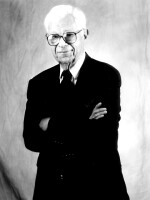DANIEL SCHORR: Last week at the G8 Summit in Japan, the new super power kid on the block, Russia's Dmitry Medvedev, cross paths with the soon departing President Bush.
ROBERT SIEGEL, host:
NPR senior news analyst, Daniel Schorr.
SCHORR: In an exchange of courtesies, the Russian called our president, George, and Mr. Bush praised Medvedev as smart. It was their way of marking time until the new American president comes along.
Two months after being installed by his mentor, Vladimir Putin, Medvedev has yet to give any indication of how much he will be the puppet, how much the innovator. So far, he has stuck close to the Putin line. Like Putin, he supports the Six-Party Talks on North Korea's nuclear program and he joins in the international effort to induce Iran to give up its nuclear weapons aspirations.
But in the long-standing Russian tradition of siding with countries liberated from colonialism, he has joined with China in vetoing United Nations sanctions against Zimbabwe. Like Putin, he's a hardliner on Russian security and equally willing to use the oil weapon as the instrument of pressure.
As Putin, in 2006, closed a pipeline through Lithuania and shut off natural gas to Ukraine for three days to counter pro-Western actions. So now, Russia, last week, reduce the flow of oil to the Czech Republic when the Prague government signed an agreement with the United States to deploy the tracking radar for a missile defense system.
Former secretary of state Henry Kissinger has been in Moscow recently talking, he said, to leading political personalities whom he did not name. In an article in the Washington Post, the father of (unintelligible) with the Soviet Union now reports his impression that a new face of Russian politics is underway, which may lead to some kind of redistribution of power. He adds that a Russian democracy is not pre-ordained, of course, but he urges the Bush administration and the presidential candidates to give Russia a chance and to restrain public comments.
Once again, as often in the past, America's veteran diplomat seems to see openings for accommodation and went (unintelligible) with interest the emergence of a new and friendly Russia that is not immediately evident to other scholars of Russia's evolution.
This is Daniel Schorr.
MICHELE NORRIS, host:
And this is NPR, National Public Radio. Transcript provided by NPR, Copyright NPR.






